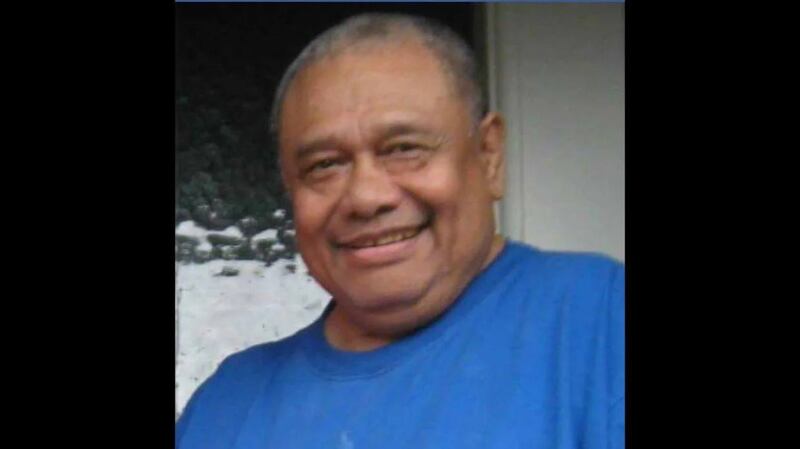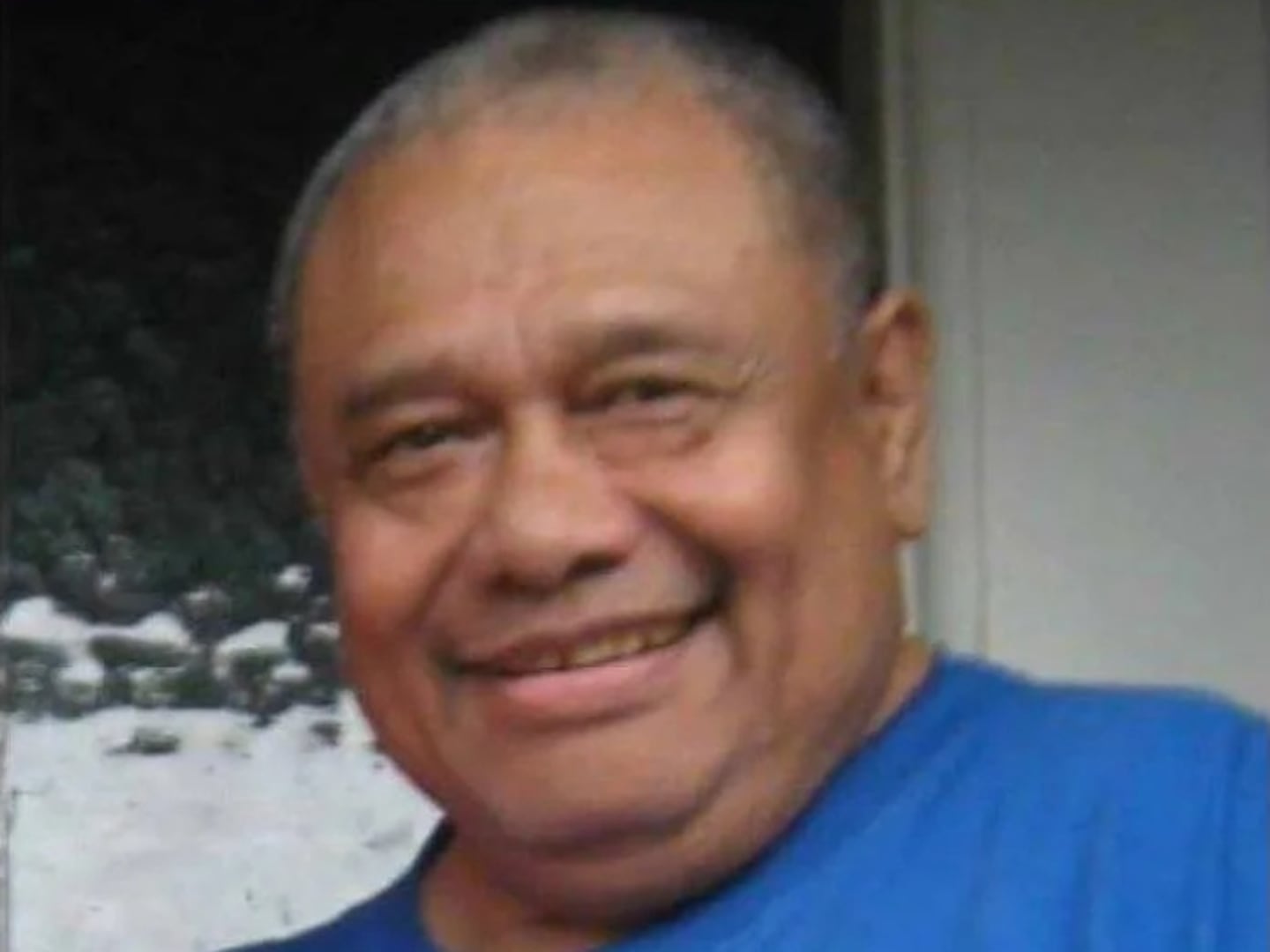There are two dates in your life that you should always remember, Peter Talalelei would tell his daughter.
The day you are born and the day you die.
But Tiresi Peterson wasn’t able to be with her father when he died. Their families weren’t able to bury him.
It’s just shy of 10 years since the 70-year-old went missing without a trace.
It’s believed Tupulaga Talalelei (known as Peter) entered Wellington’s Petone foreshore and drowned, never to be seen again, although, without evidence, that remains speculation.
Talalelei lived in the Bay Lodge Boarding House at Petone, and had limited mobility due to a medical condition.
He’d only recently been discharged from hospital when he was last seen in the kitchen at the house around 2am on July 13, 2014.
An extensive search started after Talalelei was reported missing on July 15, but no trace of him was ever found.
“It’s sad. And I wonder if justice will ever be served in relation to all those gaps,” Peterson, his eldest of five girls, said.

She remembered her father as humble, kind, funny, and as a man of routine.
“I think that’s why we all think we’re a bit of a comedian as well,” she said with a laugh.
Talalelei worked at biscuit company Griffins for a long time, and Peterson remembered he lost a pinky and got a big compensation payment.
“When we were little we used to always get the broken biscuits that he would bring home from Griffins, and he’d say if his pinky showed up to let him know.
“He even told us that our uncle was Peter Maivia, which is The Rock’s grandfather. I’m not even sure that that’s true. I think every Samoan thinks they’re related to The Rock.”
Peterson moved to Australia with her mum before she turned 10, but they spoke regularly on the phone and she would often visit.
“I even tried to talk to him about coming to Australia, cause he was there on his own. And that was something that he thought about but he just did not like change. And he knew everyone in Petone, and everyone in Petone knew him.”
Talalelei didn’t feel like he was stuck in Petone.
“Because he loved the community and he had a very well established network of people who just knew him as someone who would catch the bus, as someone who was smiley.
“He never had an aggressive bone, he was smiley, cheeky. He knew all the bus drivers, the TAB workers, he was kind. He was a kind-hearted spirit, and would never harm anyone.”

Talalelei was under the care of the Hutt Valley District Health Board’s district nursing service and had a caregiver who visited the privately run boarding house two or three times a week to help him with personal hygiene, a report by Coroner Peter Ryan said.
His mobility had been compromised over the years due to gout.
Bay Lodge Boarding House manager Peter Genet said Talalelei went into the hospital about three weeks before he disappeared due to a cardiac condition.
His caregiver requested he be moved from an upstairs room to downstairs, as he had difficulty negotiating stairs.
He was discharged on July 12 and, despite being seen early the next morning in the kitchen, no one saw him leave, Genet said.
According to Genet, Talalelei used to use a walking frame, but was using a walking stick before his disappearance.
He described Talalelei as moving “slowly and tortuously, like he was 1000 years old”, spending a lot of time sitting around not doing anything.
Sophie Cunningham, a social worker employed by the Hutt Valley District Health Board, said she supported Talalelei during his last hospital stay, and arranged for him to be given the downstairs bedroom.
She was told on July 14 and 15 that the caregiver had been unable to locate him and called the police.
‘Peter’s disappearance remains a mystery’
Police extensively searched in a 300m-radius around the boarding house and examined CCTV footage from the Petone CBD but officers came up empty, the coroner’s report said.
They also did above-surface and below-surface searches around the Petone wharf area and the foreshore, and searched the greater Wellington Harbour area.
Police found Talalelei had a reasonably healthy bank balance, but there had been no transactions since his disappearance, other than automatic payments.
“Peter’s disappearance remains a mystery, and the police file remains open and is reviewed at regular intervals,” the report concluded.
Coroner Ryan said, given the circumstances, it was very unlikely that he remained alive, fending for himself since July 2014.
He declared Talalelei likely dead at an inquest in 2018.
Ryan said his body would have been found by police if he’d died on land, which meant it was more likely he entered the foreshore and died in the sea.
“There is no evidence before me to indicate that Peter has intentionally entered the sea for the purpose of taking his own life.
“But it is also possible that he walked out on to the wharf and accidentally fell into the water and was unable to extricate himself.”
When Detective Sergeant Grant Carroll moved into a new role, the box of files on Talalelei went with him.
“And it’ll stay with me until I retire,” Carroll said.
He’d been involved since the very beginning, and said it was his only active missing persons case.
Carroll said the coroner’s conclusion was the most probable.
But no-one saw him go into the water, there was no CCTV footage and none of his belongings were recovered.
“When you go to the main strip, there are CCTV. There was no sign of him going that direction.”
And Carroll said Talalelei wasn’t very mobile, he’d recently been in the hospital, used a walking stick and couldn’t have travelled very far.
But he said there was never any suggestion his disappearance was suspicious.
“He was a very insular, non-offensive, kindly person.”
He said a couple of years ago someone phoned CrimeStopper and said they thought Talalelei was living next door to them in Auckland.
Police investigated, and found a man who looked similar to Talalelei, but it wasn’t him.
Carroll said he thought about Talalelei often and when his team got together they often reflected on what happened.
“It was a case of, where is this man? This man can’t go far. He isn’t mobile, he doesn’t have a car. We all put a lot of heart and soul into trying to find him.
“I think one of the great things was that all the people we interviewed were really genuinely happy to help. Remembering things, helping with finding records.
“That’s the great thing about policing, the people.”
He said it was hard, for both him and his staff. “Our aim is always to find a person and return them to their loved ones.”
‘Ten years is a long time’
They were always hopeful more evidence would come to light, but scientifically it was unlikely, he said, especially if Talalelei had made his way into the water.
“Ten years is a long time. We can only work on the evidence we have.”
Peterson said she wished some of their questions could be answered, for closure.
“We wish there was a body. It’s hard because he has grandchildren, and great-grandchildren now, so it’s hard to keep his legacy alive.
“We’re always hopeful that there will be some sort of evidence.
“He lived such a simple, quiet, humble life that he was not deserving of whatever happened to him.”
She said her father was sorely missed, especially when it came to important dates, like birthdays, that have passed without a phone call from him.
“It’s just the sadness and shock of not finding him and never having evidence.
“It’s certainly a case where there’s a gut feeling that’s like he’s not at peace because the truth has not come out.”

